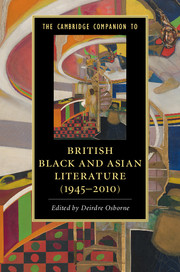Book contents
- Frontmatter
- Dedication
- Contents
- Contributors
- Acknowledgements
- Timeline
- Introduction
- PART I TRACES AND ROUTES
- PART II TRANSLOCATIONS AND TRANSFORMATIONS
- PART III RESTORATIONS AND RENOVATIONS
- 7 Recalibrating the Past: The Rise of Black British Historical Fiction
- 8 Black Women Subjects in Auto/biographical Discourse
- 9 British Black and Asian LGBTQ Writing
- 10 The Poetics and Politics of Spoken Word Poetry
- 11 Post-colonial Plurality in Fiction
- PART IV NATIONAL, INTERNATIONAL, TRANSGLOBAL
- Further Reading
- Index
- Series list
8 - Black Women Subjects in Auto/biographical Discourse
from PART III - RESTORATIONS AND RENOVATIONS
Published online by Cambridge University Press: 05 September 2016
- Frontmatter
- Dedication
- Contents
- Contributors
- Acknowledgements
- Timeline
- Introduction
- PART I TRACES AND ROUTES
- PART II TRANSLOCATIONS AND TRANSFORMATIONS
- PART III RESTORATIONS AND RENOVATIONS
- 7 Recalibrating the Past: The Rise of Black British Historical Fiction
- 8 Black Women Subjects in Auto/biographical Discourse
- 9 British Black and Asian LGBTQ Writing
- 10 The Poetics and Politics of Spoken Word Poetry
- 11 Post-colonial Plurality in Fiction
- PART IV NATIONAL, INTERNATIONAL, TRANSGLOBAL
- Further Reading
- Index
- Series list
Summary
The uses and functions of autobiography as witnessing, testimony or as autoethnography continue to present as urgent questions of authority, ethics, legitimacy and truth. These are the issues that have become the central preoccupation of autobiographical theory and criticism. The privileging of these autobiographical forms by writers marginalised in Anglo-European traditions of literature and criticism has provided an opportunity for writers and critics to invigorate a form that has looked increasingly ‘disreputable and self-indulgent’ and to extend autobiography's limits, while not abandoning its commitment to an authorial presence that is generically defined. The autobiographical self, while central to the narratives discussed in this chapter, occupies multiple subject positions: at the borders and in the margins of dominant discourses of race, gender and nationality, but also at the centre of a growing body of self-representation that seeks to replace the ‘white male story’ with the whole story of lives made hitherto invisible. The diversity and instability of the selves that black British women's autobiography constructs serve as a caution against an insistence on the authority of marginalised voices that in the process reproduce ‘the imperializing tendencies of the old Cartesian self’. Necessary safeguards need to be erected against both the articulation of either an exceptional exemplar or an overdetermining ‘we’.
As Kate Douglas has noted, critical examinations of autobiography and autobiographical forms provide a perfect location from which issues of generic identity, authority and authorship, as well as complex questions of voice and subjectivity (who is speaking, and from where), continue to be negotiated. In addition, as a site where the public and private interconnect, autobiography provides a space in literary criticism for the exploration of issues of narrative responsibility and the ethics of disclosure. These intra- and extra-textual entanglements are the contexts within which identities – gendered, cultural, social and political – are interrogated, disturbed and reconfigured. Within the space of this short, exploratory chapter my focus is, therefore, necessarily narrow. It is impossible to address in detail the complexities of black/Black, British, gendered identities, and so I follow the tendency in contemporary literary criticism to use ‘black’ to denote authors and protagonists of African heritage. I have also structured a discussion of selected texts around their representation of experiences of trauma that perhaps inevitably, as I demonstrate, characterise contemporary autobiographical self-articulation.
- Type
- Chapter
- Information
- Publisher: Cambridge University PressPrint publication year: 2016
- 1
- Cited by

